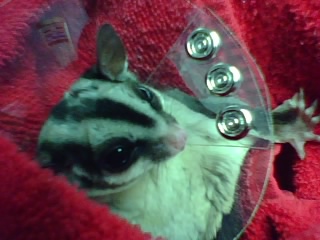Recognizing
Periodontal Disease
In your Sugar Glider
**************************************************************************
Periodontal disease DOES affect Sugar Gliders. Though it is not (yet) a part of our routine care for sugar gliders to do dental care, it SHOULD be a regular part of the care you provide to inspect your glider’s teeth and gums a minimum of ONCE MONTHLY.
Possible signs of periodontal disease include:
* Facial swelling
* Change in behavior accompanied by change in eating habits
* Unwillingness to eat harder foods - reliance on pureed foods
* Weight loss with no other explanation
* Difficulty chewing
* Decreased activity level
* Gums that are red or bleeding
* Tartar on teeth
* Loose or missing teeth
Please NOTE that many of these symptoms can indicate OTHER health issues. Therefore, it is essential that you have a VET examine your glider for periodontal health during wellness checks.
Steps to Better Dental Health
* Ask your veterinarian to check your glider’s teeth at EACH visit.
* Feed a diet which includes a wide variety of textures and hardness
* Provide regular items for chewing/stripping that will allow the glider to use his/her teeth as they were intended (branches, meal worms, eucalyptus branches & leaves)
* Inspect your glider’s teeth at least once monthly and see a vet if there are concerns.
If your glider is diagnosed with periodontal disease:
* You can do daily/weekly dental care with chlorhexidine rinse and use of a tiny toothbrush.
* Follow your vet’s instructions for use of antibiotics and/or changes in diet closely.
* Do not neglect follow up visits with the vet.
